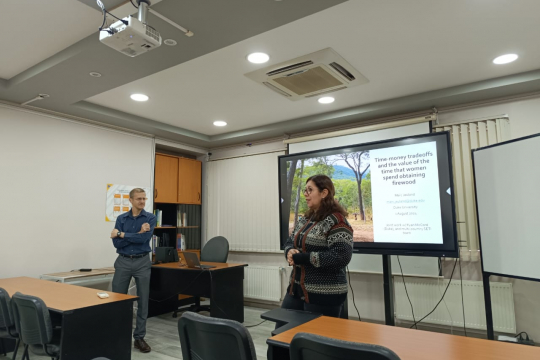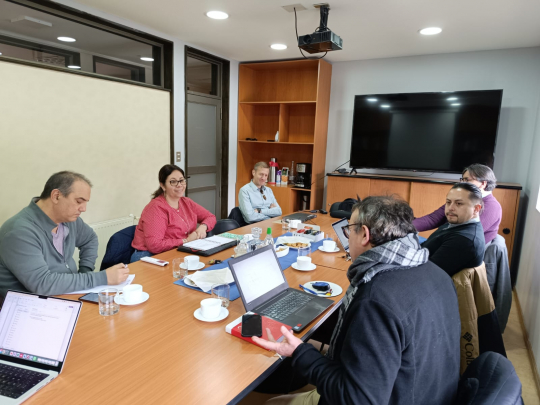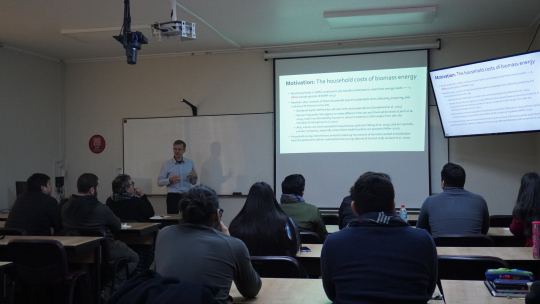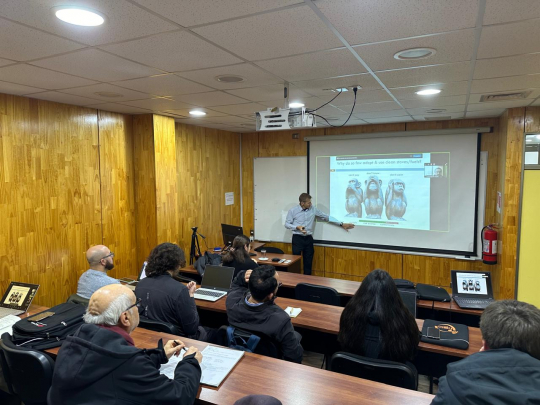Marc Jeuland, co-leader of SETI, visited the headquarters of SETI in Chile from July 29 to August 2 to meet with the co-leader Marcela Jaime and the admin and strategic teams of the collaborative program. The visit also included meeting with students from SETI-related Chilean universities, in the collaborative’s advanced human capital formation pillar framework.
During his visit to Universidad de Concepción, Campus Chillán, Marc Jeuland held meetings to discuss the current work plan of the collaborative program as well as plan future activities. Those meetings included Marcela Jaime, Mauricio Oyarzo (EfD Chile Deputy Director), and Cristóbal Vásquez-Quezada (Project Coordinator of SETI and EfD Chile).
Marc Jeuland also met with the SETI local team: Carlos Chávez (Universidad de Talca), César Salazar (Universidad del Bío-Bío), Walter Gómez (Universidad de La Frontera), and Mauricio Oyarzo and Marcela Jaime, both from Universidad de Concepción. This team provides feedback on SETI activities from a local and a global perspective. The team also supports the strategic discussions in SETI’s steering committee.
Engaging with PhD students in Chile
During his visit, Marc Jeuland engaged with undergraduate and postgraduate students at three Chilean universities. On July 30, he spoke at a seminar series at Universidad de Talca. On July 31, he lectured first-year PhD students at Universidad del Bío-Bío, and on August 1, he presented his research at Universidad de Concepción.
Carlos Chávez from Universidad de Talca indicated that "Hosting Dr. Jeuland was a pleasure. He met with graduate students in economics and faculty members at the School of Business and Economics interested in the economic and social aspects of energy transitions. He also presented his ongoing research as part of our seminar series”. Carlos also indicates “we had ample space for academic dialogue and exchanging ideas on future research. We are very grateful for Marc's visit."
César Salazar from Universidad del Bío-Bío added, "Marc lectured on interventions for sustainable energy transitions as part of our Microeconomic Theory course in the Doctoral Program in Economics and Information Management. The hybrid-mode lecture allowed participation from both campuses of the University.” César adds that “Marc also interacted with our Department’s Head, researchers, and PhD students in environmental economics. His field experience inspired many PhD students to consider interventions for their research."
Topics discussed included time-money tradeoffs, the value of women's time in obtaining firewood, and behavioral interventions for sustainable energy transitions. This interaction allowed students to discuss global and local issues and learn intervention techniques for their research. The students were also invited to join the vibrant SETI network.
Some ideas for the future
As 2024 marks the final year of SETI's second phase, the team has been actively planning activities for the second half of the year. This involves analyzing research ideas and strategies to implement in the next phase, with a particular focus on generating impactful policy research. Additionally, the team has considered promoting grants for junior researchers in African countries to support ideas that can secure funding in larger calls. These efforts aim to foster collaboration among research fellows and ensure the research agenda remains updated and relevant for the regions where SETI focus. Furthermore, the team is organizing activities for EfD’s Annual Meeting, which will take place in Nairobi, Kenya, from October 3-6.
SETI will also promote some public goods, including material that can serve researchers, policymakers, and other interested parties, such as workshop material, short courses (e.g., Marc’s short course on energy transition at UCT in 2024), and policy briefs.



